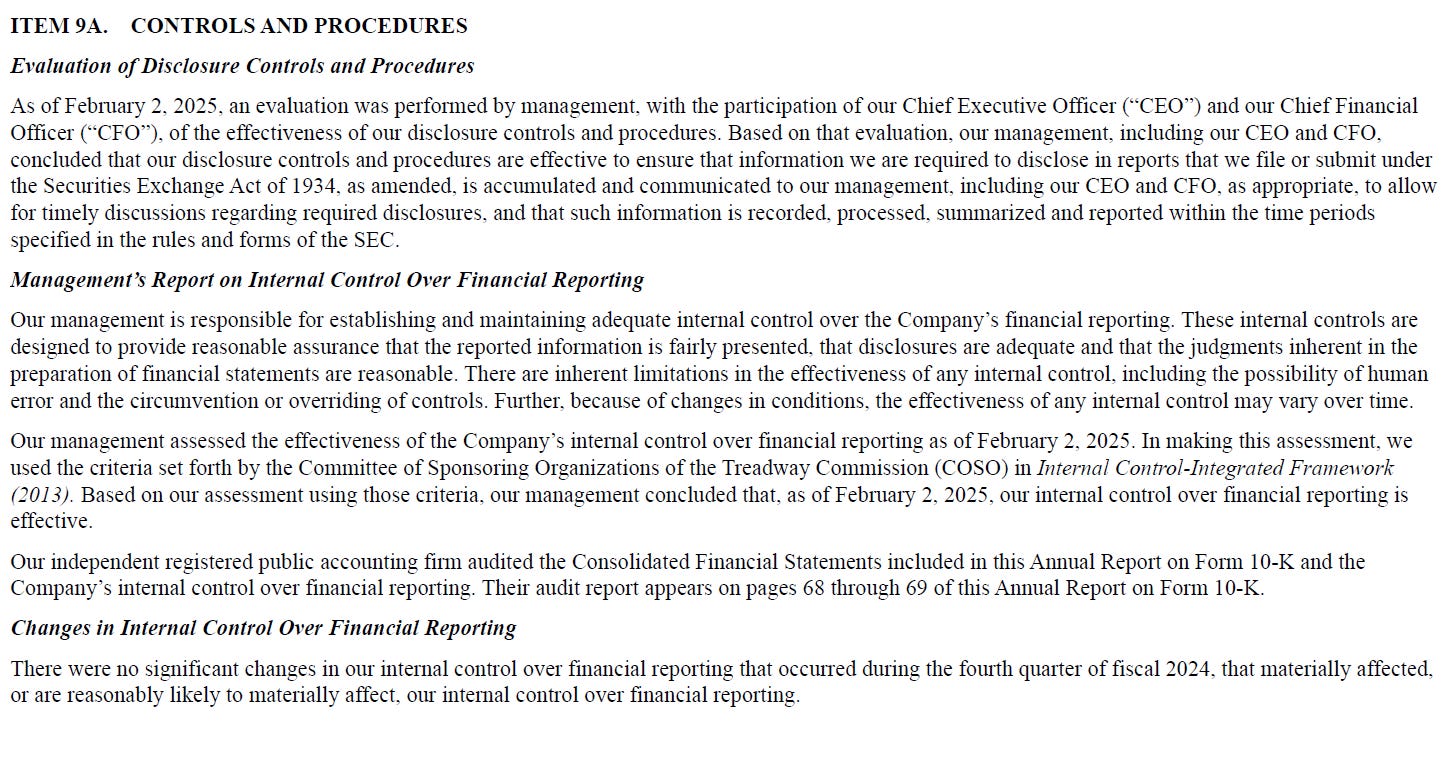Williams-Sonoma's Internal Controls Over Financial Reporting Raise Red Flags
WSM has reported 2 large-scale errors to its previously reported financial statements in just the last 12 months alone. Heads need to roll.
Two weeks ago, Williams-Sonoma (WSM - $165.01) reported its Q4 2024 financial results.
Q4 2024 bottom-line results again beat expectations as the company has clearly focused on profitability of late as opposed to top-line growth.
But, when inputting the numbers into my earnings model, I quickly noticed that the quarterly results for Q1-Q4 2024 did not add-up to the company’s FY 2024 numbers in the quarterly earnings press release.
Naturally, when this happens (rare), I start thinking “what did I screw up?” start Then, I started going through the quarterly results for Q1-Q3 2024 (press releases and 10-Q filings) and began double-checking my model’s numbers, formulas, etc.
I sent an email to the company asking why the quarterly results did not add-up to the full-year results and whether this discrepancy may be answered in the company’s subsequent 10-K filing.
The company ignored my email.
So, when the 10-K was filed last week I found out the reason for the quarterly versus fiscal year discrepancy.
On page #71 of the 10-K filing, the company copped to an “immaterial correction of interim” financial statements (i.e., Q1-Q3 2024).
Here’s the company’s description…
“In connection with our fiscal year-end close process, we identified that we did not timely record shrink losses for certain inventories not ultimately received, which also impacted our bonus accrual, in the first three quarters of fiscal 2024.”
So, the company’s EPS in Q1-Q3 2024 was inflated by $0.04, $0.07, and $0.09, respectively.
Here’s the screenshots of the correction that is buried near the end of the company’s 10-K filing…
The company considers these immaterial adjustments to Q1-Q3 2024. But, let’s be clear that these particular adjustments benefited the company in each of these quarters (artificially inflated EPS) and helped to super-charge the EPS ‘beats’ relative to consensus sell-side expectations in each of the quarters as well.
What I find odd is that management did not highlight, or even subtly mention the Q1-Q3 2024 adjustments when reporting the company’s Q4 2024 results on March 19, 2025.
But, I think there’s a reason they made no mention of the adjustments.
Just 3 quarters prior, WSM management disclosed another accounting error that required an out-of-period adjustment.
Here’s the company’s disclosure of this particular accounting error that was disclosed in the company’s Q1 2024 10-Q filing…
Of course, WSM management suggested that this particular freight expense error (fiscal years 2021 through 2023) was immaterial. Hmm.
Therefore, WSM management disclosed 2 significant accounting errors over the past year.
Maybe I’m dating myself. But, I come from an era where one large-scale accounting error or misstatement would have been a fire-able offense for a CFO and/or corporate controller.
Not only was no one apparently fired, but the company’s auditor report (10-K) makes no mention of lackluster internal controls (page #68 and #69) and the company’s own assessment of its internal controls (page #70) says that there were “no significant changes in our internal control over financial reporting that occurred during the fourth quarter of fiscal 2024, that materially affected, or are reasonably likely to materially affect, our internal control over financial reporting.”
See below.
So, the external auditor (Deloitte & Touche) and the company have no issues with the large-scale financial reporting anomalies that were unearthed in FY 2024.
Let me be clear. Most investors recognize that external audit firms provide management teams a rubber stamp for a company’s reported financial results. Ages ago, I was an external auditor. I get it. There’s a reason Deloitte & Touche has been WSM’s external auditor for 44 years! Looking the other way is many times part of the job description for an external auditor.
But, for both Deloitte & Touche and WSM management to stick their heads in the sand and not admit, at minimum, the shortcomings of the company’s internal control over financial reporting of late is ridiculous.
With two egregious accounting errors over the past year and no formal recognition of an underlying structural problem (i.e., internal controls over financial reporting), I’m waiting for the next (accounting) shoe to drop at WSM.
The company’s Audit & Finance Committee needs to do the work it probably should have done following the first accounting error. Heads need to roll!








